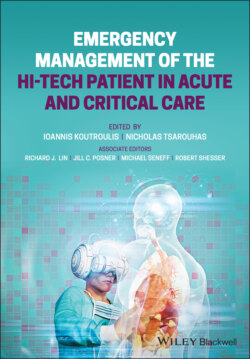Читать книгу Emergency Management of the Hi-Tech Patient in Acute and Critical Care - Группа авторов - Страница 67
Complications Hepatic Encephalopathy
ОглавлениеThe liver processes toxins when blood is drained from the mesenteric system and filtered prior to returning to systemic circulation. Creation of a portosystemic shunt allows for the mixing of unfiltered intestinal blood into the hepatic vein. Hepatic encephalopathy occurs when unprocessed toxins are not removed effectively. Encephalopathy, if left untreated, may lead to patients progressing from mild confusion to altered levels of consciousness and even coma.
Most patients with portosystemic shunt related hepatic encephalopathy present two to three weeks after the TIPS procedure. Mild forms may be missed, as patients present initially with confusion and forgetfulness. Reversal in the sleep–wake pattern, with patients being awake at night and asleep during the day, is the first stage indicator of encephalopathy. Second stage may move to personality changes and worsening lethargy with altered consciousness. Severe encephalopathy can cause coma, seizures, and neurologic changes, including clonus and asterixis.
While encephalopathy may be noted after the initial TIPS procedure is performed, there are usually background causes that aggravate the symptoms. Episodes of esophageal bleeding, increased protein intake, worsening renal function, or constipation cause an increased gastrointestinal nitrogen load. Some medications or drugs of abuse (including alcohol) can be implicated. Patients who experience infection are at an increased risk of encephalopathy. Finally, many cases, up to 30%, have an unknown trigger.
Encephalopathy is a clinical diagnosis. While lab investigations may reveal elevation in liver enzymes and ammonia, there are no specific levels at which these tests are diagnostic. Most commonly, brain imaging does not show abnormalities. However, once the diagnosis of encephalopathy is suspected, investigation into the other attributing factors listed above may help with therapy.
Treatment of encephalopathy focuses on reversal of any of the secondary factors in combination with decreasing gut reabsorption of nitrogen waste products. Lactulose increases gut transit and may decrease production of nitrogen by intestinal bacteria. Addition of antibiotics, including rifaximin or metronidazole, also decreases intraluminal nitrogen production by decreasing intestinal bacterial load. Patients are encouraged to eat a nutritious diet with an appropriate amount of protein. Often, encephalopathy in patients with TIPS resolves spontaneously or with minimal change. In about 5% of patients with TIPS, if medical management of encephalopathy is not effective, the TIPS procedure may need to be reversed.
